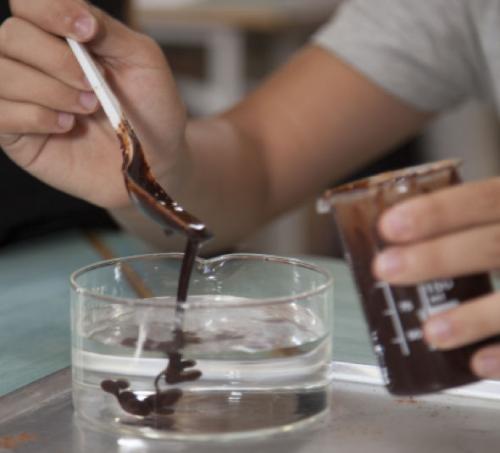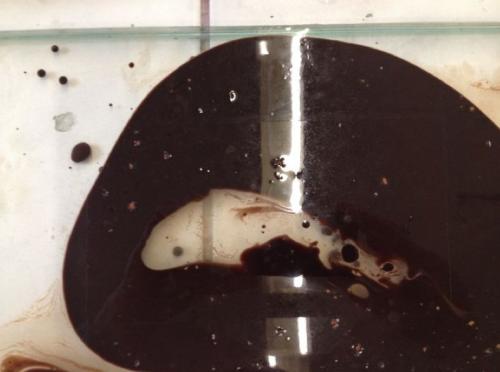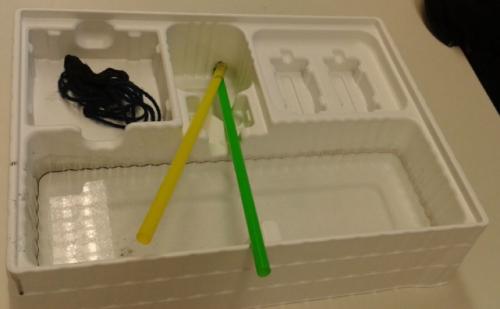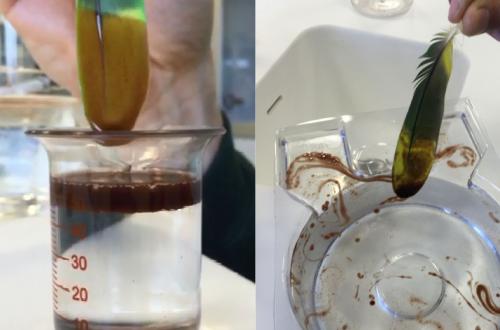The Black tide – oil in the water SAILS inquiry and assessment unit focuses on the study of the effects of an oil spill on our coast. Students investigate an oil spill using a model system to simulate the behaviour of oil in water and identify factors that influence the spread of oil. Students can consider the ecological impact of an oil spill, and the challenges that are posed to scientists and society. This unit is recommended for implementation at lower second level, as a bounded or guided inquiry.
This unit can be used for development of many inquiry skills, in particular planning investigations, developing hypotheses and working collaboratively. In addition, students can develop their scientific reasoning skills through collecting data and drawing conclusions, and enrich their scientific literacy by critically evaluating their investigations. Proposed assessment methods include teacher observation, student artefacts and peer- and self-assessment.
This unit was trialled in Portugal, Hungary, Germany and Greece – producing five case studies of its implementation. Four case studies describe the experiences of teachers with lower second level students, while one Hungarian implementation was with upper second level students. Students in the case studies were aged 12-16 years and of mixed ability and gender. Planning investigations was assessed in four of the case studies, while developing hypotheses and working collaboratively were also assessed in some cases.
- The effects of an oil spills on our coasts
- Chemical mixtures (behaviour of oil in water)
- Equilibrium of ecosystems
- Lower
- Planning investigations
- Developing hypotheses
- Forming coherent arguments
- Working collaboratively
- Scientific reasoning
- Classroom dialogue
- Teacher observation
- Peer-assessment
- Self-assessment
- Worksheets
- Student devised materials
- Presentations
The teaching and learning activities described in the Black tide – oil on the water SAILS unit were adapted from the iLit project, developed by Cláudia Faria at the Instituto de Educação da Universidade de Lisboa (IEUL) and funded by the Portuguese Foundation for Science and Technology. The activities were adapted for the SAILS project.
Since the 1970s, oil spills in the ocean have been frequently in the news. The Amoco Cadiz accident, which occurred in the French administrative region of Brittany in March 1978, is one of the most well-known. This disaster spilled 1.635 million barrels of oil, equivalent to about 220 tons. The Exxon Valdez accident, discussed in this unit, spilled 260 thousand barrels, or about 35 tons. The consequences of such spills for living species (including human beings) and ecosystems are dramatic. This activity aims to explore some of these consequences, allowing students to increase their scientific literacy while developing their inquiry skills. The Black tide – oil on the water SAILS unit is recommended to be implemented as a bounded or guided inquiry, and a suggested student worksheet is provided.
This unit offers opportunities for the assessment of all SAILS inquiry skills (planning investigations, developing hypotheses, forming coherent arguments, working collaboratively) and key competencies (scientific reasoning, scientific literacy). The teacher may carry out the assessment in class through observation and classroom dialogue, or utilise the student worksheets for evaluation. The assessment should be based on aspects such as understanding the terms and concepts involved, full development of the experiment (planning and implementing), correct handling of materials and equipment, accuracy in recording data and adequacy of the proposed experimental protocol (variables tested experimentally and answers to questions).
In addition to developing students’ inquiry skills, students can gain substantive and procedural knowledge. After carrying out the tasks in this unit, students should be able to explain the behaviour of oil in water, plan experiments and record data appropriately. Through development of their reasoning capabilities, students should be able to interpret data and make inferences. In addition, they should be able to communicate scientifically, using appropriate language and presenting data and ideas in different ways. This inquiry should encourage students to be curious and creative and to pursue their investigations with rigour and perseverance.
Below you can find the full inquiry and assessment unit for download, as well as an archive with classroom materials, including student worksheets and assessment tools for teachers to be used during the activities if available.
Unit booklet Classroom materials| Concept focus |
The effects of an oil spill on our coasts
Chemical mixtures (behaviour of oil in water)
Equilibrium of ecosystems
|
| Inquiry skills focus |
Planning investigations
Developing hypotheses
Forming coherent arguments
Working collaboratively
|
| Scientific reasoning |
Identification of variables
|
| Scientific literacy |
Identifying the consequences of oil spills on ecosystems
|
| Assessment methods |
Classroom dialogue
Worksheets
Student devised materials
|
This unit was trialled in four countries, producing five case studies of its implementation – CS1 Portugal, CS2 Hungary, CS3 Hungary, CS4 Germany and CS5 Greece. All the case studies were implemented by teachers who had some experience of teaching through inquiry and most of the students had prior experience of inquiry activities. However, in CS1 Portugal and CS5 Greece, the students had no prior experience with inquiry.
The case studies detail implementation at lower second level, except in CS3 Hungary which features a 9th grade class (upper second level). The students involved in the case studies were 12-16 years old and of mixed ability and mixed gender. In CS1 Portugal, the student group represented a very good performance level in school achievement.
CS2 Hungary and CS4 Germany describe two lesson periods of 45 minutes each. CS3 Hungary describes one lesson of 45 minutes, plus a double lesson period of 90 minutes. CS1 Portugal describes four 90-minute lesson periods, while CS3 Greece was implemented over three 45-minute lessons.
The key skill assessed was planning investigations, but the teachers in the case studies also selected additional skills to develop. The assessment methods described include classroom dialogue, teacher observation, evaluation of student artefacts and peer-assessment.
The inquiry approach used in all the case studies was that of bounded inquiry, i.e. it was guided in the sense that the teacher posed the initial question but there were open inquiry opportunities in that students had freedom in addressing the question. For example, the unit activities start with the introduction of an environmental problem, and the students are asked to plan an experiment related to this problem. This can be totally open (students propose a full experimental plan and implement their plans) or can be guided (students propose and discuss an experiment, but follow a given protocol for implementation).
This activity aims to contribute to the understanding of inquiry processes, such as experimentation and argumentation, and to the promotion of thinking skills, attitudes and values required for students to take an active role in decision-making about socio and environmental concerns. The activities of this unit can be used to integrate different curricular subjects (physics, chemistry, biology, geography, mathematics, environmental education).
The students in all the case studies worked in groups throughout the lessons, although group composition varied.
The Black tide – oil in the water SAILS teaching and assessment unit was recommended to teachers for the assessment of planning investigations and scientific reasoning, however implementation has shown that this activity is appropriate for assessment of the four SAILS inquiry skills – planning investigations, developing hypotheses, forming coherent arguments, working collaboratively – and scientific reasoning. Although the skills developed during these activities are valuable contributors to a students’ overall scientific literacy, no teacher chose to assess this dimension in the case studies. However, within the case studies the students’ increase in understanding of both the properties of oil in water, and how the experiment provides a model of a real-world oil spill is observed.
The assessment was conducted through the analysis of students’ artefacts in almost all case studies, which included worksheets and presentations. The teachers also assessed students’ skills through direct observation. Some teachers used rubrics for in-class evaluation of performance, although they may also be used for evaluation of student artefacts after the lesson. Peer-assessment was used in CS4 Germany and CS5 Greece. In all case studies, the teacher provided formative assessment through oral feedback, in particular during collaborative work. In some cases, the teacher provided written feedback at the end of the activity.
Below you can find the full inquiry and assessment unit for download (excluding the case studies), as well as an archive containing all the case studies.
Unit booklet Case studies| Concept focus |
Behaviour of oil in water
|
| Activities implemented |
Black tide – oil in the water
|
| Inquiry skills assessed |
Planning investigations
|
| Assessment methods |
Teacher observation
Student devised materials
|
| Level |
Lower
|
| Age |
12-14
|
| Prior experience with inquiry |
No experience
|
| Concept focus |
Behaviour of oil in water
|
| Activities implemented |
Black tide – oil in the water
|
| Inquiry skills assessed |
Planning investigations
Developing hypotheses
Working collaboratively
|
| Scientific reasoning |
Defining variables
|
| Assessment methods |
Classroom dialogue
Teacher observation
Worksheets
|
| Level |
Lower
|
| Age |
13-14
|
| Prior experience with inquiry |
Some experience
|
| Concept focus |
Behaviour of oil in water
Environmental impact of oil spills
|
| Activities implemented |
Black tide – oil in the water
|
| Inquiry skills assessed |
Planning investigations
Developing hypotheses
Working collaboratively
|
| Assessment methods |
Classroom dialogue
Teacher observation
Worksheets
Student devised materials
|
| Level |
Upper
|
| Age |
15-16
|
| Prior experience with inquiry |
Very experienced
|
| Concept focus |
Oil pollution – removal of oil from water
|
| Activities implemented |
Black tide – oil in the water
|
| Inquiry skills assessed |
Planning investigations
|
| Assessment methods |
Classroom dialogue
Teacher observation
Peer-assessment
|
| Level |
Lower
|
| Age |
12
|
| Prior experience with inquiry |
Some experience
|
| Concept focus |
Environmental impact of oil spills
Behaviour of oil in water
|
| Activities implemented |
Black tide – oil in the water
|
| Inquiry skills assessed |
Planning investigations
Developing hypotheses
Forming coherent arguments
Working collaboratively
|
| Assessment methods |
Classroom dialogue
Teacher observation
Peer-assessment
Self-assessment
Worksheets
Presentations
|
| Level |
Lower
|
| Age |
12-13
|
| Prior experience with inquiry |
No experience
|





